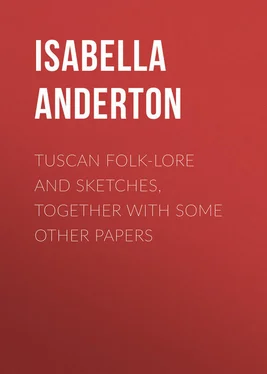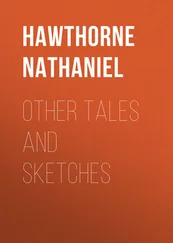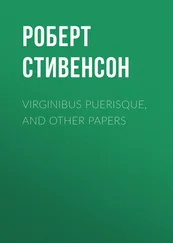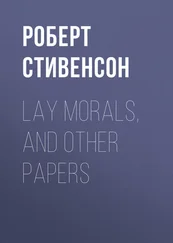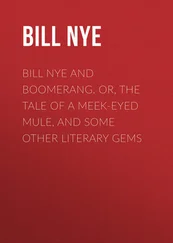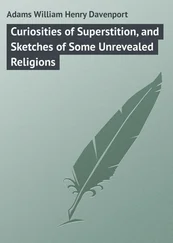Isabella Anderton - Tuscan folk-lore and sketches, together with some other papers
Здесь есть возможность читать онлайн «Isabella Anderton - Tuscan folk-lore and sketches, together with some other papers» — ознакомительный отрывок электронной книги совершенно бесплатно, а после прочтения отрывка купить полную версию. В некоторых случаях можно слушать аудио, скачать через торрент в формате fb2 и присутствует краткое содержание. Жанр: foreign_antique, foreign_prose, на английском языке. Описание произведения, (предисловие) а так же отзывы посетителей доступны на портале библиотеки ЛибКат.
- Название:Tuscan folk-lore and sketches, together with some other papers
- Автор:
- Жанр:
- Год:неизвестен
- ISBN:нет данных
- Рейтинг книги:4 / 5. Голосов: 1
-
Избранное:Добавить в избранное
- Отзывы:
-
Ваша оценка:
- 80
- 1
- 2
- 3
- 4
- 5
Tuscan folk-lore and sketches, together with some other papers: краткое содержание, описание и аннотация
Предлагаем к чтению аннотацию, описание, краткое содержание или предисловие (зависит от того, что написал сам автор книги «Tuscan folk-lore and sketches, together with some other papers»). Если вы не нашли необходимую информацию о книге — напишите в комментариях, мы постараемся отыскать её.
Tuscan folk-lore and sketches, together with some other papers — читать онлайн ознакомительный отрывок
Ниже представлен текст книги, разбитый по страницам. Система сохранения места последней прочитанной страницы, позволяет с удобством читать онлайн бесплатно книгу «Tuscan folk-lore and sketches, together with some other papers», без необходимости каждый раз заново искать на чём Вы остановились. Поставьте закладку, и сможете в любой момент перейти на страницу, на которой закончили чтение.
Интервал:
Закладка:
The man went off to bed, and the girl set to work. She made a great doll of dough and put it in her bed; then she put clothes and money into the chest, crept in herself, and pulled down the lid.
The next morning the man got up early. “Wife, wife,” he shouted, “good-bye!”
No answer. “Ah, I forgot, she was up late making bread. She’s a dear little wife, and works very hard.”
So he crept on tiptoe to her bedside, saw the figure under the clothes, and went out as quietly as he had gone in.
Then he took the chest and started. Again he wanted to set down his burden, again the warning voice stopped him, and at last he flung down the box at his mother-in-law’s door, declaring that this was the last he would bring her.
When he got home he called, “Wife! wife!”
Still no answer. “What, is she still asleep? She must be tired”; and he went to shake her. Then he found that there was no wife there, but only a figure of dough, and that he was alone once more in his underground palace.
TASSA
Clementina had enticed me to her cottage with the promise of country beans cooked in country fashion, to be followed by a story under the chestnut woods. So at about four in the afternoon, when the heat of the day was over in the breezy mountain village, I sauntered through the street, past the swarming black-eyed children, and the cheerful, smiling washerwomen busy at the tank under the pump, out on the white road beyond; and, gazing now at the landscape on the left, now at the ever-varying forms of the Apennines before me —
“Ever some new head or breast of them,
Thrusts into view,”
says Browning – now climbing the bank on the right for flowers or mountain-strawberries, I arrived, after half an hour’s stroll, at the little hamlet of Ciecafumo.
There stood the cluster of smoke-blackened cottages, with the large patch of rye, beans, etc. (apparently common property), before them, against a background of magnificent chestnut trees. Passing under a picturesque archway, and crossing a cobbled space which did duty as a street, I pushed open the wooden door of Clementina’s house. Before me was a flight of stairs which might have been washed towards the end of the last century: on the right the kitchen; and, dim in the blue, arching wood-smoke, Clementina, with eyes as bright as ever under her kerchief; and sprightly little Nella, barefooted, and, still more extraordinary, bareheaded.
It was a large, low room, with stone walls and a gaping plank ceiling, which formed also the floor of the room above, all encrusted with the black lichen-like deposit, harder than the stone itself, produced by the smoke of wood-fires. In one corner was a tiny window, and on the same side with it the hearth, with a wooden roof over it in lieu of chimney. The wood-fire, the cat, the red pipkin with the old woman bending over it, formed a pretty interior against the dark shadows of the great stack of brushwood which, with a flight of very rickety stairs, occupied the further end of the room.
“Where do the stairs lead, Nonna?” I asked.
“Oh, those lead into the cat’s rooms. You can go up if you like, but I advise you not to. It’s years since I have been there, and I expect they’re rather dirty.”
It need hardly be said that I did not go up. The beans being now ready, a space was cleared on one of the two tables, which, loaded with most heterogeneous material, were propped up against the wall opposite the fire. Above the tables was the one patch of colour on the black walls – a coloured print or so of saints, a couple of rosaries, and a tiny hanging tin lamp. The old woman spread a coarse, newly-washed table-napkin on the space she had cleared, and placed on it a hunch of bread (brought that morning from the village), one glass, a little bottle of oil, and some salt in a piece of paper. The wicker-covered water-flask was put on the ground beside us; three chairs were produced, and three soup-plates, with brass spoons. Then the beans were divided and dressed with oil and salt, the bread was carved into three parts with a great clasp-knife from the old woman’s pocket, and we made a very excellent and nourishing meal. The one glass did duty for all three of us, being rinsed out with a peculiar jerk on to the stone floor after each had drunk.
“Now the story, Nonna,” said I.
So Clementina took up her knitting, and, locking the door behind us, we went out into the fresh, sweet evening air. We sat down under a huge chestnut tree. A number of little girls came clustering around us, busily engaged in making chestnut-leaf pockets for their wild strawberries and whortle-berries, and the old woman began: —
Once upon a time there was a poor woman who had one daughter. One day, as this daughter was out in the forest getting firewood she struck her axe into a hollow tree. As soon as she had done so, a beautiful lady appeared and said to her: —
“Will you come with me, little girl? I will take care of you, and give you everything you want.”
So the little girl said yes, she would go, and the lady, who was really a fairy, took her to a beautiful palace.
“Now,” said this fairy, “when you’re alone, and want me, you must call me Tassa, but when anyone else is with you, you must call me Aunt. You won’t always see me, but as soon as you call me I shall come to you. You may do what you like and go where you like in this palace.”
So the girl lived for some time in the palace in the forest, and grew more and more beautiful every day. At last it happened that the king’s son, out hunting in that forest, came to the palace and saw the girl at the window. He rode round trying to find a door, but there was none.
“Let me come in and talk to you,” he said to the girl. So she went into the next room, and called out “Tassa.”
“What do you want, pretty maiden?”
“The king’s son asks to come and talk to me.”
“Let him come.”
And immediately the prince saw a door and went in. After a little while he said: —
“I should like to marry you; you are the most beautiful woman I have seen.”
So the girl went into the next room and called “Tassa.”
“What is it, pretty maiden?”
“The prince wants to marry me.”
“Let him come in a week with all his court and fetch you.”
Then the prince went away, and the fairy gave the girl a box, saying: —
“If you want to remain beautiful, take this box with you; and don’t forget to say good-bye to me before you go.”
At the end of the week the prince came with a great train of carriages and courtiers to fetch his bride, and the girl was so dazzled by the splendour, and excited at the thought of marrying the prince, that she forgot to say good-bye to the fairy, and forgot her box till she was in the carriage. Then she suddenly remembered it, jumped out, and ran upstairs to the cupboard where she had put it. Now this was a cupboard in the wall, and the door pushed up as a shutter might do. The girl raised the door and put her head in to look for the box, when bang! down came the shutter on her neck.
“Tassa, Tassa,” she shouted.
“What do you want, ugly wench?”
“I forgot to say good-bye to you. And oh, please let me out.”
Then the cupboard door was raised, and the girl went downstairs. But when she appeared everyone began to laugh, for she had a sheep’s head!
The prince made her get into the carriage, and then pulled down all the blinds, so that no one might see his ugly bride; and when he got home he had her put into the sheep stable.
Now there were three beautiful women at the king’s palace who all wanted to marry the prince, and the prince did not know which to choose. So he brought some wool and said: —
Читать дальшеИнтервал:
Закладка:
Похожие книги на «Tuscan folk-lore and sketches, together with some other papers»
Представляем Вашему вниманию похожие книги на «Tuscan folk-lore and sketches, together with some other papers» списком для выбора. Мы отобрали схожую по названию и смыслу литературу в надежде предоставить читателям больше вариантов отыскать новые, интересные, ещё непрочитанные произведения.
Обсуждение, отзывы о книге «Tuscan folk-lore and sketches, together with some other papers» и просто собственные мнения читателей. Оставьте ваши комментарии, напишите, что Вы думаете о произведении, его смысле или главных героях. Укажите что конкретно понравилось, а что нет, и почему Вы так считаете.
